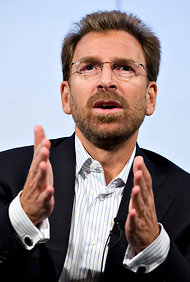I left one out.
Last week, in an article detailing Al Gore’s negotiations with cable and satellite carriers about the sale of his cable channel Current TV, I wrote, “Mr. Gore, who lost his last big legal argument — the one in 2000 — succeeded.” He got most of the big carriers to consent to the takeover of Current by Al Jazeera.
There was actually another big legal argument by Mr. Gore between the time he lost the presidency in 2000 and he won support for the Current TV sale in 2013. It’s a tale almost no one knows about, of something that took place in 2005 when Mr. Gore and his business partner, Joel Hyatt, were trying to get Current off the ground. This one, Mr. Gore won.
The year before, Mr. Gore and Mr. Hyatt had acquired a small international news channel called Newsworld International from Vivendi. They were initially going to rename the channel INdTV. But Mr. Hyatt came up with another name, Current TV, while on a ski vacation in Utah with his son.
He and Mr. Gore announced the new name in April 2005, four months before the planned start (or, rather, restart) of the channel. But a company called Current Communications objected. This Current was a provider of broadband Internet through electric power lines in Cincinnati, with ambitious plans to expand to other states.
The company owned trademarks for “Current Communications” and “Current Broadband,” and had submitted applications for a batch of other Current-related names. So Current Communications filed a trademark lawsuit and sought a preliminary injunction to stop Current TV from being born.
The ensuing hearing was held “in a federal courthouse in Cincinnati, in front of a federal judge appointed by George H.W. Bush, who also was a former Republican county commissioner,” said Joseph R. Dreitler, the lead lawyer for Current TV.
Cincinnati is a Republican city, and there was some concern that Mr. Gore would “get homered by a local Republican,” Mr. Dreitler said, meaning that the judge would favor the home team, not the out-of-town Democratic visitor.
The hearing for the injunction was scheduled for late July, a week before Current TV’s scheduled restart date. Mr. Dreitler recalled that Mr. Gore and Mr. Hyatt told him shortly before the hearing, “If you lose, we will have lost $75 million.” He answered, “Thanks, guys, no pressure there.”
Mr. Gore was present for the entire hearing. During the break for lunch, he and Mr. Hyatt dined at a nearby Wendy’s.
According to Judge Sandra S. Beckwith’s subsequent ruling, Current TV’s lawyers asserted in court that if the injunction were granted, the channel would have “virtually no programming to put on the air (all of its logos, etc. have already been incorporated into its programming), the network will ‘go dark’ — i.e. stop broadcasting.”
“It will then default on its leases,” their argument continued, “be compelled to cease business, and investors’ contributions of $75 million will be lost.”
Current Communications’ lawyers said that it had spent a lot of money, too: millions of dollars marketing its brand-name service. Looking a few years into the future, the company said it envisioned providing fast access to video via its power-line broadband. It’s easy to imagine that service being called Current TV.
But Judge Beckwith found that this service still appeared to be in the planning stages. And she said that the claim about millions in marketing expenditures was “suspect.” Over all, she concluded, “neither party appears to be clearly headed for a collision with the services presently contemplated by the other, and neither party appears capable of providing the other’s services.”
Judge Beckwith ruled that Current Communications would most likely not prevail at trial, so she denied the company’s request for a preliminary injunction.
Mr. Dreitler said the case was his defining moment as a trademark lawyer. He recalled walking out of the courthouse with his clients and hearing Mr. Gore say to Mr. Hyatt, loud enough so Mr. Dreitler could hear, “If Dreitler had done that argument in the Supreme Court, I would be president.”
Today, the tale is just a footnote for history. The Current Communications name has been retired; the company now goes by Cincinnati Communications. In a few months the Current TV name will be retired, too, and Al Jazeera will take its place.
“It’s just a shame they could never break through the clutter and talking heads of cable,” Mr. Dreitler said.
Article source: http://mediadecoder.blogs.nytimes.com/2013/01/08/a-tale-from-gores-quest-for-current-tv/?partner=rss&emc=rss
